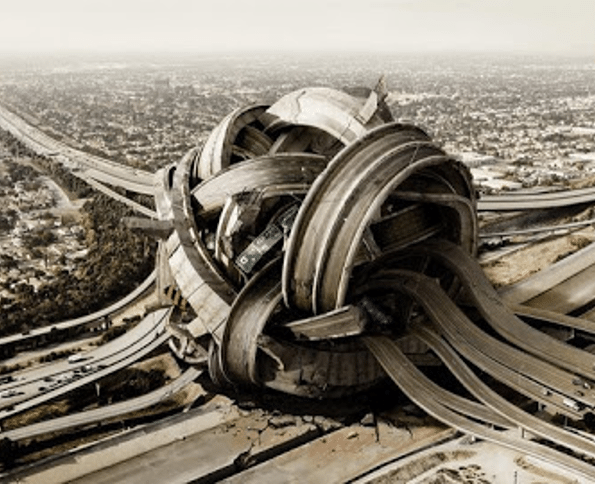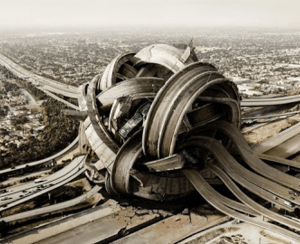When I was thirteen, my family moved to Birmingham England. My parents were teachers of the arts and we were going on exchange from a small rural community in Ontario to a city that was the heart of the industrial revolution. It was, needless to say, an experience that was an outright assault on all of my senses. In navigating my way through that year however, I learned a lot and became a keen traveller. On one of our first weekend adventures out of the city in our cramped little Renault hatchback, we got stuck going around and around the loopy roundabouts of a mess of merging highways known in Brum as ‘spaghetti junction’.
Ok, this wasn’t it, but that’s how it felt to thirteen year old me. In thinking about one of the first questions posed to me for my Cohort 21 application: What does 21st century education mean to you? I have often come back to that visual of spaghetti junction; a huge mess of interconnecting roundabouts, a merging of many pathways designed to get us going in the direction of our next adventure. This is where I am at in my thinking around 21st century education. My thoughts are a bit of a mess, truth be told. But here is what I am sure about, we are in the midst of a paradigm shift in education. We are tasked with preparing young people for an uncertain future using tools that change so rapidly that it requires that we take on the role of learner and leader simultaneously. Engaging with this shift requires a new mindset; new ways of communicating with our students, colleagues and our broader communities. It requires a critical look at the balance of skills and content; our approaches to teaching and learning and the application of foresight in decision making.
In this, my first blog entry, I thought perhaps I could put forth some ideas and questions that have captured my interest in the hopes of connecting with others who would like to take the conversation further. This is really what brought me to Cohort; the potential to listen to, learn from and collaborate with like-minded educators with the goal of improving my own practice, and sharing with my colleagues.
- I feel that the role of a ‘teacher’ is evolving to become more of a facilitator; What does that look like? How might I share that role with other ‘experts’ by leveraging technology?
- How might I improve my creative confidence and bolster my confidence to take risks?
- How might I prepare students to ‘add value’ in a world of smart technology?
- It seems to me we need to invest more in the development of socio-emotional skills; particularly empathy; how might I leverage technology to build empathy?
So you see, I am at spaghetti junction; my thoughts are messy, but I know they are connected and likely to take me in the direction of adventure. I am optimistic about the time I will spend within this supportive community investigating these and other questions; I look forward to connecting with many of you over the course of this (r)evolutionary experience!
“Please always remember, the secret of survival is to embrace change, and to adapt.”
-Rohinton Mistry, A Fine Balance


I am so relating to this right now. I just wrote a post on giving children experiences and thought maybe this is what I should do this year… build in experiences as much as I can BUT WAIT… I have other thoughts as well.. gratefulness, assessment and writing, technology integration, character education in elementary schools, what’s the most important focus in my classroom!? A spaghetti junction! It’s nice to hear I am not alone and that maybe it is all connected and will become clearer… soon 🙂
@jbaptist Thanks for your response, all of those thoughts you list have crossed my radar too! It is hard to set priorities for directing our energies when it seems like everything is important! Our school has just started working with NSRF and introducing the idea of ‘critical friend groups’. I haven’t gotten into this too deeply yet, but I imagine there may be a way to ‘share the load’ in our consideration of all of these priorities!
https://www.nsrfharmony.org/about-us/faq
Hi Allison,
I thoroughly enjoyed reading this post and love the metaphor of “Spaghetti Junction”. It’s great to have messy thoughts, as it shows that you’re passionate about furthering your teaching and learning! I am hopeful that you will find answers to all four of your questions during your Cohort 21 journey. Without a doubt, our second F2F will help you with “improving your creative confidence” and “investing in empathy”, as the talented @lmcbeth will be leading the cohort through a session on Design Thinking.
I look forward to seeing if one of these questions becomes the focus for your Cohort 21 Action Plan.
Thanks for the great read! See you on the 18th!
Nicole
@ddoucet @lmustard @jbornstein @amacrae
Thanks @nblair! Appreciate your feedback and looking forward to the 18th!
Hi Allison,
I love the Spaghetti Junction image! It really conveys how hellish it is to drive around 🙂 I am English and grew up in Suffolk. We moved to Vancouver almost 5 years ago and then came to Toronto just over 2 years ago. The countryside around Birmingham is beautiful, I can see the narrow winding lanes now.
I think both our experiences of moving to new countries probably has a big influence on our approach to teaching and life in general. One of the things that I try to share with my students is the willingness to take measured risks with their academic work. Students who are used to success at school can sometimes be quite risk averse and often opt for the safest route to a top grade in assignments. They can also struggle to deal with early failures in projects and can find it difficult to persevere and amend their plans in response to formative feedback. I think that one of the most valuable things I have learned from moving country and then moving from BC to Ontario, is to plan thoroughly, then expect to continually modify your plans as different situations arise. I think that resilience is a highly valuable skill for students to learn throughout high school, to prepare them for an increasingly unpredictable and ever changing world.
Interesting post, thanks.
Laura
@lross Thank you for your thoughtful response! I have to say that your point about opting for the safest route to a top grade, stood out to me because I think as a teacher I have often done this too … it can be hard to take a risk on designing tasks that take a more complex route to a final grade when there is so much riding on the final grade!
Thanks again.
Hi Allison,
Your post really resonated with me. Your graphic of the spaghetti junction is representative of an iterative thinker (vs. a linear thinker – which would be a smooth/straight road). Throughout most of my life, I have been conditioned to think linearly, and have found comfort in doing so! A linear thinker has a preset goal, and a clear(ish) path to attaining that goal. Indeed, linear thinking and process is very effective for many tasks. However, in shifting toward a pedagogy that fosters and facilitates “21st century learning skills”, a linear process becomes slightly more convoluted. Indeed, I would argue that 21st century learning skills are not new to this century…. The deep learning goals outlined in Michael Fullan’s 6 C’s, for example (Character, Citizenship, Communication, Critical Thinking, Collaboration, Creativity) have been part of the educational experience of humankind since the formation of a social contract into formalized societies. However, what has changed (as you aptly point out) is the heightened usage level of technology. It is clear that tech tools can facilitate much greater connectedness (something I am still working on), access to information, and mediums of product. Furthermore, edutech tools foster engagement into the learning process on the part of students, and this is an excellent precursor to deep learning. In my opinion, the most important question you have asked yourself in this post is Q#2. I would gently opine that you need to take risks in order to then gain the confidence to further leverage technology (i.e learn through practice). As Michael Fullan states: “Ready, Fire, Aim!” I have been experimenting with a multitude of ever evolving edutech tools with varying degrees of success (and failure) in my practice over the years, and am slowly becoming comfortable riding around the spaghetti junction (with some linear detours along the way).
@mbrims thank you so much for this thoughtful response! Your connection to iterative thinking touched on another piece of the 21st century puzzle for me – integrative thinking, something that our school has done work with the iThink people on. I know a little about this, but continue to hone my skills in this area – it is particularly useful for geographers I think. Thanks for the connection to Fullan’s 6C’s, I had not come across this before, but the concept of NPDL resonates deeply. I appreciate your encouragement around risk taking in the classroom, I am gently moving forward with that goal! Thanks again.
What a terrific metaphor and visual to represent what 21st century learning means to you, not to mention a great first foray into the blogsphere!
I love all of the comments and conversations you’ve helped to generate, this post has pushed @jbaptist to think about all of the other aspects that she’s passionate about, and a great lesson in resilience from @lross – what an adventure! @nblair highlights that your questions will be validated and you will have an opportunity to explore these through our Design Thinking process at the next F2F.
I love what @mbrims mentions with iterative thinking. That is the biggest shift for us all, and the question is, do we have the creative confidence to take this risk. To learn from the process, and continually iterate until we’ve arrived at something excellent we didn’t realize was even possible when we began. It’s hitting that mess of junctions and missing your exit again and again until you figure out how to get there. This is the paradigm shift you mention and the dragon we’re all chasing as education evolves.
Addressing Q4: Check out Amber Case’s “We are all cyborgs now” especially as we move students toward tech. https://www.youtube.com/watch?v=z1KJAXM3xYA
Thanks for such an engaging blog post!
@ddoucet Thanks so much for this thoughtful response, you have actually connected some dots for me here and unleashed some inspiration on the way! Really enjoyed Amber Case’s TED talk … the mental reflection piece is really key here to the role we play as educators and parents … “the most successful technology gets out of the way and let’s us live our life” – I love this. Thanks again.
I think your spaghetti junction metaphor and image are exactly what it feels like to be an educator today. We don’t actually know where we are headed and what the kids need in order to be their best for tomorrow. You highlighted 2 things that really resonate with me about my role as an educator. #1 – Above all else, character and most specifically Empathy! How critical is empathy?!? Regardless of where technology goes and where we are as a society head, we will ALWAYS need empathy and improving our students understanding of that has to be a win. I also love the idea of teacher as facilitator. From day 1 that has been my approach to teaching so I love to hear that other people see teaching through that lens as well. I can’t wait to hear more about your ideas!